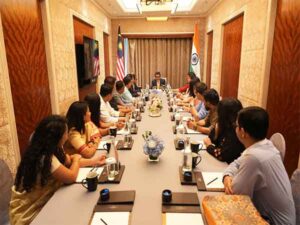China’s activities in Nepal more assertive after formation of Dahal-led govt: Report
Kathmandu [Nepal], January 28 (ANI): After the formation of the Maoist Chairman Pushpa Kamal Dahal ‘Prachanda’-led government in Nepal on December 26, 2022, China’s activities in the country have become more assertive, EPardafas reported.
Dahal took oath as Nepal’s Prime Minister on the 130th birth anniversary of Mao Zedong – Prachanda’s ideological father. Nepal on November 20, 2022, held its general election in which Dahal’s Maoist Centre established itself as the third largest party winning 32 seats in the 275-member House of Representatives.
According to the EPardafas report, China’s belligerence has become more evident in Nepal after the November 20 elections and the formation of the Dahal-led government. This suggests that Nepal could be in favour of Beijing’s South Asia advance.
Upon Dahal’s appointment as the Prime Minister, the Chinese Embassy in Kathmandu was the first foreign mission to congratulate him on his appointment.
On December 26, Mao Ning, the Spokesperson of the Chinese Foreign Ministry, as quoted by EPardafas, said, “As Nepal’s traditional friend and neighbour, China deeply values its relations with Nepal.
We stand ready to work with the new Nepalese government to expand and deepen friendly exchange and cooperation across the board, pursue high-quality Belt and Road cooperation, inject new impetus into our strategic cooperative partnership featuring ever-lasting friendship for development and prosperity and deliver more benefits for our two peoples.”
There have been various activities by China in Nepal after the installation of the Dahal government. On December 27, 2022, a Chinese expert team arrived in Nepal to conduct a detailed study of the Kathmandu-Kerung railway. The Kerung-Kathmandu railway is one of the nine development projects under China’s BRI in Nepal.
Even though the Dahal-led Communist government in Kathmandu is enthused and optimistic about getting Beijing’s support for economic prosperity, experts and senior economists in Kathmandu express fear about the BRI. They are worried that the implementation of large-scale projects could push Nepal into a debt trap, like Sri Lanka, which could undermine its sovereignty in the long run, EPardafas reported.
Recently, the media reported that China’s salami-slice strategy on Nepal’s northern border has resulted in the encroachment of 36 hectares of Nepal’s land at 10 places on the northern border by China.
According to the survey document issued by the Ministry of Agriculture, China encroached on 36 hectares of Nepal’s land at 10 places on the northern border. Similarly, the study conducted by the Ministry of Home Affairs has concluded that it is necessary to include border issues in the “state policy” of Nepal, reported Meta Khabar.
However, the world community and the Nepalis themselves are probably unaware of the magnitude of the problem.
China’s People’s Liberation Army (PLA) built a veterinary centre for animal husbandry in 2016, located in a Nepal district, but Nepal has not responded to this.






